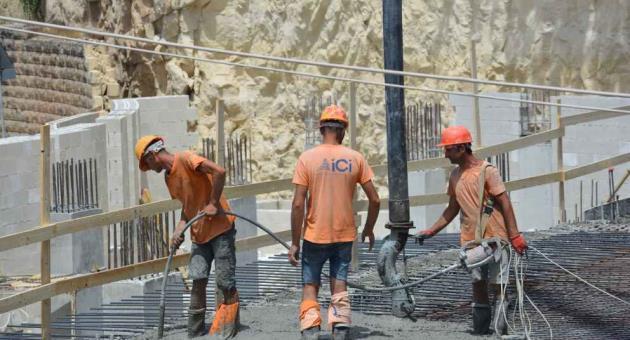The national interest must supersede economic interests, Friends of the Earth Malta (FoEM) director Martin Galea De Giovanni said while criticising overdevelopment in Malta.
"Nobody has the right to ruin the country," he said during an interview with The Malta Independent on Sunday.
Galea De Giovanni took aim at the way planning permits have shaped the country over the years.
While being asked about the construction and planning sectors, he said that the Environment and Resources Authority (ERA) should be given the ability to veto planning applications that go before the Planning Authority's Board.
Galea De Giovanni said that it is a regular occurrence that the ERA would be outvoted.
The environmental NGO representative also said that the PA "can completely ignore the input" from both the Superintendence of Cultural Heritage as well as ERA.
Through a veto option on the PA board, the ERA would have its say strengthened, he said. Currently, the ERA gets a single vote through its representative who sits on the board.
Galea De Giovanni lamented about the country's current direction and about how the PA's decisions are hampering the sustainable progression of the Maltese islands.
"I wonder if actual decisions are taken by the Planning Authority per se or if it is just approving," Galea De Giovanni said.
He also expressed frustration at the take up of ODZ (Outside Development Zone) land. The eNGO director said that in his view, ODZ land should have its status respected and that "there should be no further take-up unless it is for something of real national importance. But even this is becoming an issue".
"Certain applications should not even be entertained," he said. "There are regulations that are quite clear." He detailed that these regulations are sometimes worked around either through the way they are interpreted or through the PA voting in favour of these applications anyway. Additionally, he said that it is typical that, in these instances, the PA votes in favour of certain developments after requesting cosmetic changes within applications, which are then made. Galea De Giovanni said, however, that in spite of these concessions, these applications still end up taking up ODZ land.
He was asked about the recently approved permit for 22 apartments near the Ġgantija Temples. The site currently consists of an existing two-storey building with an ancillary garage and stores, with undeveloped land at the rear. The application was approved but four appeals have been filed with the Environment and Planning Review tribunal.
"The fact that someone applied for an application 200 metres away from one of our most historical sites, I think says a lot about the sense of entitlement of certain people as well," he said. "In this case, the policies are quite clear," he said, but added that the applicants behind the development managed to get through them after making some adjustments. "The government has every right to legislate in favour of good planning practices and the common good, even when it comes to correcting errors from the past."
He said that from this case, FoEM derives that the PA entertains every application, including those within no-go areas with the reasoning that "everyone has a right to apply for a permit, wherever, under the [given] conditions".
He said that there are also instances where people continuously submit the same applications with the mindset that it will eventually be approved. Galea De Giovanni said he knows of an example in which a Planning Application was approved on the fifth attempt. This, he added, is something else that needs to change in itself.
Galea De Giovanni said that and that "He added that the development footprint of applications for large projects should not only cater for the land area of the development itself, but also for the building's energy supply, parking spaces, roads and waste generation that could come about as a result of an application's approval.
He was asked for his opinion about Gozo, to which he described the rate of construction as "alarming and saddening".

'Tourists travelling to Malta are coming to a construction site'
Turning to tourism, he said that while there is talk about wanting to attract quality tourism, "tourists travelling to Malta are coming to a construction site
He believes that a serious discussion is needed as to what Malta would look like in the future. "Do we want to see a Dubai and bury all of our historical sites?"
During the interview, he was asked about planning and construction, tourism, energy and also about the situation on Comino and the effects of tourism on the Natura 2000 site. On this latter point, the eNGO director said that parts of Comino's management plan are being implemented, while others are not.
He described the littering situation on Comino as "grave" and said that the excess rubbish has attracted rats and has left little space for nature to breathe and recover in between tourism seasons.
He called on the government to better promote the small island's Natura 2000 environmental status, believing that this would create "added value". Additionally, he said that the extensive promotion of this environmental status could better prepare people visiting Comino to take better care of the island while there.
Aside from the environmental degradation, he said that "hundreds" of negative reviews have been left about Comino on TripAdvisor, implying that tourists are unsure of what exactly they should expect once they arrive. Despite action taken by the Ministry for Tourism on the overcrowding of deckchairs in Comino last summer, these negative reviews have persisted, he said.
He mentioned the government's model for economic growth and said that the present model, based on constant growth, does not consider quality of life.
The NGO director told this newsroom that there are some contradictions as to what government says and what is actually happening in the country. Using tourism as an example, he said that quality tourism is being talked about as of late as something the country is trying to promote, yet said that this is in contrast to the quantity of tourists brought through the popularity of low-cost airlines flying to Malta. "Sometimes, policies and actions do not match up," he said. He told this newsroom that the government's current message is that it is still looking to attract even more tourists.
"There needs to be serious thought to see what we want out of our tourism sector," he said, adding that "current levels are already unsustainable".
This is not only affecting tourists and their view of the country, he said, but it is also impacting the livelihoods of locals. "It is getting to a situation where some communities are being broken down, their sense of community lost."
He mentioned Valletta as an example of this through the number of Airbnbs that have popped up. He said that short-let properties have induced economic demand in the area, causing Valletta's long-term residents to be negatively affected financially as prices from their local grocers have increased over the years.
Another issue touched upon during the interview, dealt with traffic. He said that "there is a problem as towns and villages are being designed with cars in mind, rather than with people in mind". This "unsustainable" vision by politicians was branded to be "a short-term, very populist kind of solution" by Galea De Giovanni.
"We cannot keep adding more and more roads until the island [only] becomes covered in roads," he said. "Some unpopular decisions need to be taken."
He also highlighted the importance of ensuring "open and accessible pavements with shade that are safe for people to walk on" and said that guaranteeing this standard could incentivise more people to walk.
"Sometimes politicians look at the grander projects over the ones that could be implemented quicker and cheaper," he said, in reference to the proposed metro project, which Prime Minister Robert Abela was reported as saying was no longer a priority for the government last year.

The fight against climate change
The eNGO representative stated that the current state of national planning is not only affecting local environmental protection, but is also hindering the country's ability to effectively combat climate change.
Galea De Giovanni criticised Malta's reliance on fossil fuels and, reiterating a press statement published by his organisation, welcomed the news of a possible off-shore solar farm.
Friends of the Earth Malta is one of 14 NGOs campaigning against the proposed plans for a gas pipeline to Sicily (Melita TransGas pipeline). He said that this deal "could lead to another 30-40 years of fossil fuel reliance". He said that this reliance on fossil fuels will continue to retain itself unless funds are prioritised elsewhere.
The proposed Melita TransGas pipeline, estimated to cost €400m, was included in the EU's fifth list of Projects of Common Interest (PCI), making it eligible for EU funding, and again features on the sixth PCI list, which the European Parliament and member states now have the opportunity to review and reject in a vote in the week of 12 February.
"Money should be spent now on a mix of renewable energy sources, unless we still plan for having bigger plants for gas infrastructure," he said.
He spoke of Malta's ideal climate for solar energy and said that what is stopping households from relying on solar power on a mass national scale were concerns that an adjacent development may overshadow them in the future. This, he said, is a clear deterrent for several locals when it comes to considering the installation of solar panels on their roofs. He also mentioned that the limited roof space on more compact household units is unsuitable for solar power and that in cases where there is a complete lack of access to roof space there is no possibility of such installations.
In his view, as a small island state, Malta turning 100% green "won't make a dent in the grand scheme of reducing [global] emissions by percentage", however he said that having sunshine and the tropical Mediterranean climate, Malta could serve as an example of a case combatting climate change at a smaller scale. To do that however, "we, as a country, must not allow vested interests to interfere with the achievement of environmental goals", he continued.
Referencing the recently announced Climate Action Authority, Galea De Giovanni told this newsroom that despite concerns that it may have been established too late, its establishment is certainly a positive development. He stated that FoEM has been campaigning for the introduction, and eventually the implementing and strengthening of the Climate Action Act, for the past two decades. He said there is currently "no one-stop-shop within the public service where climate issues are debated".
The bill to establish the authority is currently making its way through Parliament.
The forthcoming Climate Action Authority will focus on implementing measures to address climate change, mitigate its impacts and assist in adapting to the evolving global climate. Environment Minister Miriam Dalli had previously said that the act will establish an authority focused on climate action, which will be responsible for coordinating strategies to address climate change at a national level. "It will bring together experts, stakeholders and policy makers to help and contribute to the creation of the road ahead when it comes to climate action," she had said.